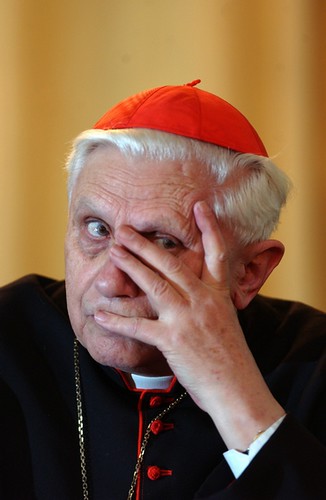Just reading over it makes me think that one of the Holy Father's most important contributions to the Holy Faith was written before he became Pope. He continued in his treatise...
'Liberation theology is a universal phenomenon in three ways:
a. It does not intend to add a new theological treatise to those already existing, i.e., it does not wish to develop new aspects of the Church's social ethics. Rather it sees itself as a new hermeneutics of the Christian faith, a new way of understanding Christianity as a whole and implementing it. Thus it affects theology in its basic constitution, not merely in aspects of its content. So too it alters all forms of Church life: the Church's constitution, liturgy, catechesis, moral options.
b. While liberation theology today has its center of gravity in Latin America, it is by no means an exclusively Latin American phenomenon. It is unthinkable apart from the governing influence of European and North American theologians. But it is also found in India, Sri Lanka, the Philippines, Taiwan and in Africa, though in the latter case the search for an "African theology" is in the foreground. The Union of Third World Theologians is strongly characterized by an emphasis on the themes of liberation theology.
c. Liberation theology goes beyond denominational borders: from its own starting point it frequently tries to create a new universality for which the classical church divisions are supposed to have become irrelevant.'
The then Cardinal Ratzinger continues in his paper to point to the Second Vatican Council as the watershed moment after which 'liberation theology' sprung up and Bishops, Priests and Religious began to wear Che Guevara t-shirts under their clerical clothing and habits...
What could have led to that complete new orientation of theological thought that is expressed in liberation theology? In the main I see three factors which made it possible.
1. After the Council a new theological situation had arisen, again characterized by three assertions:
a. The view arose that the existing theological tradition was largely no longer adequate, and that, as a result, an entirely new theological and spiritual orientation needed to be sought directly from Scripture and from the signs of the times.
b. The idea of a turning to the world, of responsibility for the world, frequently deteriorated into a naive belief in science which accepted the human sciences as a new gospel without wanting to see their limitations and endemic problems. Psychology, sociology and the marxist interpretation of history seemed to be scientifically established and hence to become unquestionable arbiters of Christian thought.
c. The criticism of tradition applied by modern Evangelical exegesis, in particular by Rudolf Bultmann and his school, similarly became a firm theological authority, cutting off the path to theology in its prior form and so encouraging people all the more to produce new constructions.
In other words, not to put a fine point on it, or to put words in the mouth of the man who would become Pope Benedict XVI, the outcomes of the Second Vatican Council were widely perceived within the Church to have constituted a rupture, a serious break with Sacred Tradition and because of this rupture, a new set of theological explanations and solutions for modern crises were sought. These explanations and solutions (cough, climate change campaigning, cough, CAFOD campaigning, cough, Fairtrade, cough, Bishops Conference of England and Wales, cough) will not satisfy man's real hunger and thirst for God, for salvation, for the merciful love of Our Lord Jesus Christ, the Saviour of the World.
The great danger of course, is that Bishops, Priests and Lay men and women neglect their salvation and the salvation of the souls of others in the pursuit of 'healing the World' and, not to put an even finer a point on it, lose them eternally. This is exactly what the Devil would enjoy. Unfortunately, as we can see from the words of the Philippine Senator in a rather high-handed letter to her Bishop, highlighted in the post below, the cunning tricks of the 'father of lies' are still persuasive, if deceitful, convincing 'even the elect of God' to suffer excommunication for a vulgar distortion of the Gospel of Our Lord.
The even greater danger, if there could possibly be one, is that unless the Church 'proclaims the entirety of the Gospel', as Pope Benedict XVI called upon the Bishops of England and Wales to do in fidelity to Christ, unless 'liberation theology' is discarded in favour of traditional Catholic piety and devotion and unless the Faithful are urged to do penance, frequent Confession, treat the Blessed Sacrament with great reverence and be faithful to the Magisterium, the Church shall lose souls on the appearance of the Antichrist, for he shall present himself as a 'man of peace' who appears to have the answers to world peace, hunger, trade, climate change and the rest. Pope St Gregory I the Great prophesised that on the appearance of the Antichrist, 'not just hoards of laity but a veritable army of Bishops and Priests will go over to him'.
The present Pope's assessment of 'liberation theology' is that it 'alters all forms of Church life: the Church's constitution, liturgy, catechesis, moral options' and presumably he meant that it does so in a not a very good and holy way. Since only a minority of modern Catholics attend traditional liturgy, receive sound catechesis and know which moral options the Church condones and which She condemns, it has to be said that the continued commitment of a seemingly sizable percentage of Catholics ordained and not, globally, to 'liberation theology' gives us a likely clue as to why, perhaps, Pope St Gregory I the Great's prophecy could be not too far around the corner. Pope Benedict XVI, now gloriously reigning, stands resolute at the forefront of the battle. We must battle alongside him for the salvation of souls!

No comments:
Post a Comment